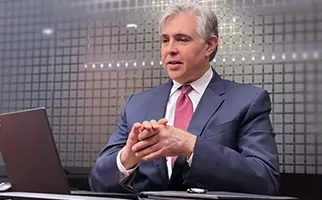TRADE SECRET LITIGATION
Trade secret litigation & misappropriation lawsuits are not to be taken lightly. Experienced lawyers make a difference.
Trade Secrets
What Happens In Trade Secret Litigation?
Many trade secret lawsuits are resolved via consent, meaning that the defendant admits the accusations and agrees to make appropriate remuneration. However, where trade secret lawsuits are contested, defendants actually win a bit more than half of the time. This often involves the failure to actually identify a trade secret, or a failure to take reasonable measures to protect the trade secret.
Trade secret lawsuits tend to be expensive, and for this reason, should not be entered into lightly. In fact, you may want to read our article on why, in some cases, litigating your trade secret can destroy you trade secret first.
How Do Trade Secret Misappropriation Lawsuits Proceed?
Lawsuits for trade secret misappropriation all follow a similar path – at least generally.
The plaintiff will file a complaint, which will generally set forth the allegations that the plaintiff claims comprises trade secret misappropriation. There will generally be at least some factual allegations as well as a recitation of the elements of the claims they are bringing.
After the defendant is served with the complaint, the defendant will either answer the complaint or file a motion to dismiss. A motion to dismiss can cover many potential grounds, such a lack of personal jurisdiction, lack of venue, or a failure to plead a required element, such as an actual trade secret, or reasonable measures to protect the trade secret. Most trade secret lawsuits involve at least one motion to dismiss, and most such motions will result in some relief.
In certain jurisdictions, the filing of a motion to dismiss can hold off discovery, although in most jurisdictions, depending on the type of motion to dismiss, discovery will usually be allowed to proceed.
If your company is deriving significant profit from information, that information probably is a trade secret. However, a company’s ability to protect the information will be highly dependent on the efforts that it takes to keep the information secret. If sufficient steps are not taken, the trade secret will be deemed to have been abandoned. Rockwell Graphic Systems v. DEV Industries, 925 F.2d 174, 179 (7th Cir. 1991).
However, while steps must be taken to protect the trade secret, the steps need not be perfect. Televation Telecom. Systems v. Saindon, 169 Ill. App. 3d 8, 15-16 (Ill. App. Ct. 2nd Dist. 1988).
Discovery in a Trade Secret Lawsuit
Discovery in a trade secret lawsuit can be exceptionally trying. As trade secret lawsuits involve allegations involving highly confidential information, the parties are often required to reveal extremely sensitive and valuable information. However, using appropriate protective orders, the likelihood of such information being released can be minimized. In particular, the use of the Outside Attorneys Eyes Only designation, which courts will make available in appropriate cases, can prevent sensitive information from finding its way to employees of the opposing side.
It should be noted that the negotiation and litigation of a proper protective order is critical to success in prosecuting or defending a trade secret claim and can often completely change the complexion of the case.
In addition, discovery in a trade secret lawsuit is often very expensive. Tens of thousands or even hundreds of thousands of documents are often exchanged in this type of litigation, making automated document review a necessity. For example, software can read in all of the word content of a document production and catalog the contents in a database, which can be searched for certain phrases, such as “work order” or “invoice,” and the limited number of documents produced in response to such a search can then be manually reviewed.
Computer forensic information, including file and device metadata, is often vital. Such information is used to demonstrate, for example, when certain files were copied, where the files were copied to, etc. Computer forensic discovery always involves computer experts, which can be very expensive.
Also, given the acrimonious nature of trade secret litigation, discovery disputes can devolve into incredibly petty, but nonetheless expensive, exercises. For example, during the process of litigation, one party may be forced to reveal information that could cast it in a bad light with a customer; e.g., the customer in question is charged a higher rate for similar work than another customer. Even though such information will likely be designated confidential or highly confidential, on learning of this, the opposing party may contact the customer under the guise of third-party discovery, and reveal the damaging information to the customer. Trade secret lawyers can be incredibly creative with devising justifications for such conduct.
Trade Secret Depositions
A trade secret lawsuit will often involve multiple depositions of employees of both the plaintiff and defendant companies, as well as third parties. As in other types of cases, depositions are vital to the success of a lawsuit, as they present the first opportunity to see how a particular witness will testify. In addition, depositions present attorneys with the all important opportunity to judge a witness’s demeanor, and whether a jury will like or dislike a particular witness.
Trade Secret Expert Witnesses
Most trade secret lawsuits will also involve a number of expert witnesses. Computer forensic experts have become extremely important. In particular, almost all information is stored and shared electronically now, so computer forensic experts are vital both in establishing that a trade secret was taken, who the trade secret was shared with, when the disclosures occurred, and potential defenses to such claims.
In addition, subject matter experts often testify as to whether a particular document is a trade secret as well as to whether or not reasonable measures were taken to protect the secrecy of the trade secret. Often, a trade secret case will involve three or more subject matter experts, which can be quite expensive. However, experienced attorneys can sometimes eliminate the need to retain an expert by finding ways to use the other side’s experts against them.
Finally, experts on damages, such as an economist, or potentially a subject matter expert, will often produce reports and be deposed as well.
Dispositive Motions and Trial in a Trade Secret Lawsuit
Like most lawsuits, the majority of trade secret lawsuits resolve by settlement rather than verdict. However, given the high stakes that many trade secret lawsuits have, a fair number of them go all the way to summary judgment and trial.
A summary judgment motion often provides a first look at what the primary issues in trial will be. The standard for summary judgment is extremely high, so the question of whether or not to file a summary judgment motion must be considered carefully, given that a summary judgment motion can easily involve fifty (50) hours or more of attorney time. However, even when a summary judgment motion is not successful, it does force the other side to marshall their best evidence, which can provide a preview of their trial strategy.
Most summary judgment motions that are filed are denied. Accordingly, most trade secret cases that are opposed will make it to trial. Trade secret cases range in complexity from trivial to highly complex, and the length of such trials varies widely as well. However, most trade secret trials involve multiple witnesses and experts, and accordingly, will exceed one week in length.
If you are a party in a trade secret trial, expect that several of your employees will be tied up for the entire length of the trial. In particular, your attorneys will need answers to unexpected questions immediately, so plan to have 2 or potentially more employees devoted to supporting them from voir dire through closing argument. Generally, one IT staff member with access to all documents and one well-informed officer is sufficient. The officer will need to have settlement authority, as settlement offers are often exchanged every night during a trial.
If you are a defendant in a trade secret lawsuit, or you are considering filing and pursuing such a case, you need experienced counsel. Our attorneys can help. Reach out to speak to an experienced trade secret lawyer today.
Trade Secret Overview
Watch Our Video
Watch our overview video on trade secrets. It covers a lot of the basics, as well as a lot of information not on this page, and is presented by Konrad Sherinian, one of the most experienced trade secret attorneys in the United States.
Call for a Consultation
(630) 318-2606
Wondering About Your Trade Secrets?
Phone Consultation
Find it easier to talk rather than write? Have a lot of questions you want to ask? Let's talk over the phone.
Virtual Consultation
Need to share something on screen with us? Like to see who you are working with? Let's get online.
In-Person Consultation
Prefer a face-to-face and a handshake? We have offices in Chicago or Naperville, Illinois.
If you have questions about what might constitute a trade secret, wondering if your business is taking reasonable measures to protect your trade secrets, need counseling, or require representation as a plaintiff or defendant, we can help.
Available 24/7
Trade Secrets FAQs
Here’s a list of the most frequently asked questions about trade secrets. Open each to see our pages dedicated to that topic.
Does my business have trade secrets?
Almost every company possesses not just one, but multiple trade secrets.
Some trade secrets are obvious, such as a special mix of spices that a restaurant uses to give a meal a signature flavor. Others are less apparent, such as a process used by the same restaurant to efficiently assign orders to different chefs in the kitchen.
But they can also be less obvious, like customer lists, prospect lists, product development plans and marketing plans.
Here's a page entirely devoted to examples of trade secrets.
What is a trade secret?
A trade secret is the oldest form of intellectual property protection, possibly dating to Ancient Rome. Trade secret forms one of the most potent and underutilized forms of intellectual property protection.
Nearly every successful business will have multiple trade secrets; for example, many law firms have templates of various documents, such as contracts or written discovery, along with guides on the use of the templates.
Here is a page entirely devoted to the definition of what a trade secret is.
How do I protect my trade secrets?
While there are no exact rules for what reasonable measures, precedent indicates that there are a few guidelines. To start, if none or minimal measures, were taken to protect the secret information, a court will likely hold that reasonable measures were not taken. There are other guidelines as well.
What qualifies as a trade secret?
To qualify as a trade secret, there must be information that is 1) used commercially; 2) is secret; and 3) that provides a competitive advantage to the person or entity with knowledge of it.
Here is our page devoted to the qualifications of trade secrets.
What is trade secret misappropriation?
Trade secret misappropriation occurs under two circumstances
First, when a person a) comes into possession of a trade secret b) of another, c) that the person knows or has reason to know d) was acquired improperly that person is liable for trade secret misappropriation.
Do I have a trade secret case?
Trade secret lawsuits tend to be expensive, and for this reason, should not be entered into lightly. If you contact us, we can help you determine if you have a likely case of trade secret misappropriation or not.
What happens in trade secret litigation or lawsuits?
Many trade secret lawsuits are quickly resolved via consent, meaning that the defendant effectively admits the accusations and agrees to make appropriate remuneration. However, where trade secret lawsuits are contested, defendants actually a bit more than half of the time. This often involves the failure to actually identify a trade secret, or a failure to take reasonable measures to protect the trade secret.
Trade secret lawsuits tend to be expensive, and for this reason, should not be entered into lightly. In fact, you may want to read our article on why, in some cases, litigating your trade secret can destroy you trade secret first.
Here is our page devoted to trade secret litigation and lawsuits.
What makes a strong trademark?
A strong trademark is unique, descriptive, and aligns closely with your brand's core values.
How can I protect my trademark internationally?
We can assist you in filing for international trademark protection through mechanisms like the Madrid System.
How long does trademark registration take?
The time can vary but typically takes several months. We will guide you through every step of the process.
What should I do if someone is infringing upon my trademark
Contact us immediately for a thorough assessment and a strategic enforcement plan.
Experienced Trade Secret Attorneys
We have extensive experience in dealing with trade secret issues, whether you require counseling or representation. Konrad Sherinian himself has litigated more trade secret cases than the vast majority of intellectual property attorneys.
Our attorneys have represented both plaintiffs and defendants and have prosecuted and defended many trade secret cases with great success. Contact us today.




